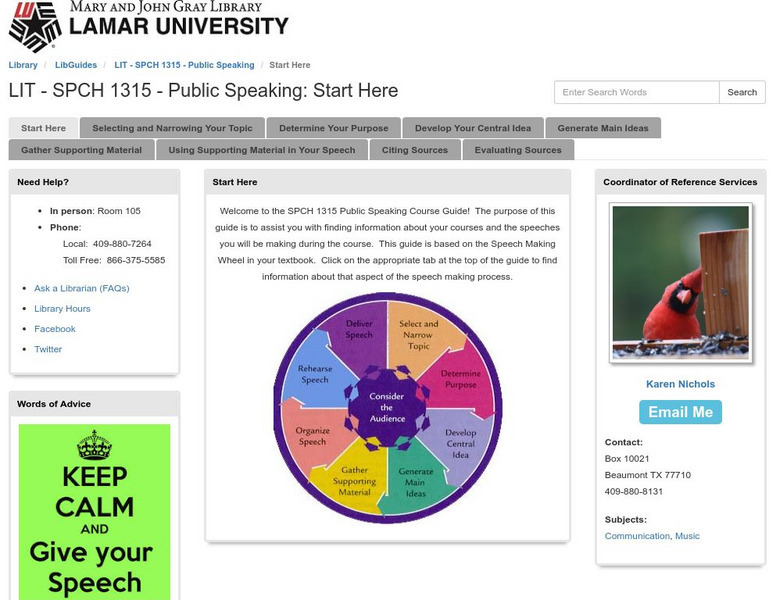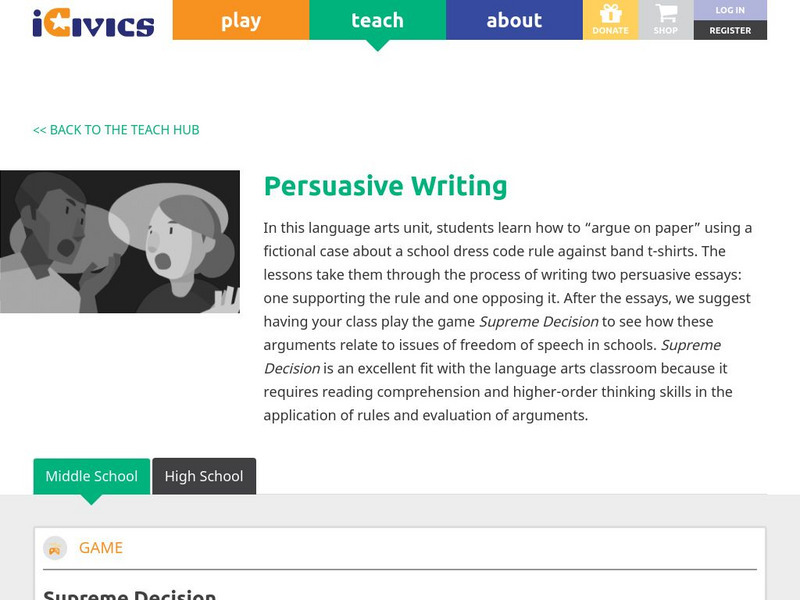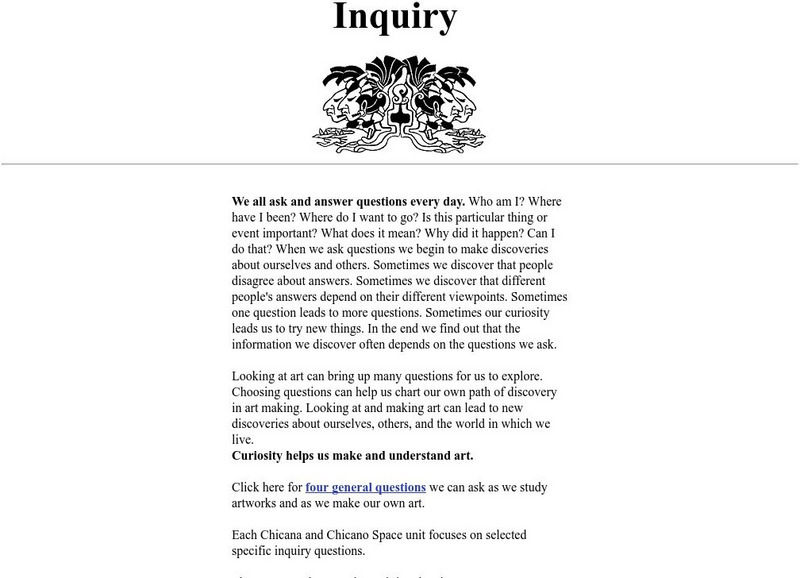Hi, what do you want to do?
Georgia Department of Education
Ga Virtual Learning: Forensic Properties of Glass and Soil Evidence
In this comprehensive interactive tutorial you will investigate the area of forensic science and how the various types of evidence differ. Learn what types of crimes involve glass and soil and what ways these types of evidence are...
Stanford University
Sheg: Document Based History: Reading Like a Historian:sourcing Classroom Poster
[Free Registration/Login Required] Sourcing asks learners to consider who wrote a document as well as the circumstances of its creation. Who authored a given document? When? For what purpose? This poster reminds students before reading a...
Other
Public Speaking: Using Supporting Material in Your Speech
The purpose of this website is to assist you with finding information about giving speeches and responding to other speeches or information.
Polk Brothers Foundation Center for Urban Education at DePaul University
De Paul University: Center for Urban Education: Think Clearly: Analyze Support a Position[pdf]
This Center for Urban Education resource provides a downloadable worksheet. Students will read a nonfiction article and then write about scaffolded prompts that will help them determine the strength of evidence presented in the argument.
University of North Carolina
University of North Carolina: Writing Center: Handouts: Evidence
What kinds of evidence best support the points you make in a paper? Where can you find the evidence you need? This handout answers all these questions and more, including the difference between primary and secondary sources. You'll also...
Texas Education Agency
Texas Gateway: Differentiate Among Empirical, Anecdotal, and Logical Evidence
[Accessible by TX Educators. Free Registration/Login Required] In this lesson, students will learn about three types of evidence that writers often rely on: logical, empirical, and anecdotal. It will also help you distinguish among these...
CPALMS
Cpalms: Lafs.8.sl.1.3
Choose from among lesson plans, assessments, and original student tutorials to teach how to analyze a speaker's arguments.
iCivics
I Civics: Persuasive Writing
In this library of mini-lessons, students will learn how to "argue on paper" or write persuasive essays using a fictional case about a school dress code rule against band t-shirts.
Better Lesson
Better Lesson: The Fossil Mind Map Unfolds
Students develop an organized mind map of facts they have learned about fossils from reading and visual content.
Other
Usa Gov: u.s. History and Historical Documents
Discover highlights from American history, including military events and founding documents.
PBS
Pbs Learning Media: Water Resource Issues
Students learn about water management challenges. They will hear from water specialists and analyze data concerning the availability and environmental impact of the use of water. They will make an evidence-based argument that supports...
PBS
Pbs Learning Media: Straight to the Source: Primary and Secondary Sources
Students discover what primary and secondary sources are and how to use them in this instructional activity from PBS Wisconsin Education. They watch video clips from the documentary "Wisconsin Hometown Stories: Neenah-Menasha,"...
Thinkport Education
Thinkport: Writing Explanation Part 3: Building an Argument
In this module, students will explore how claims, counterclaims, evidence and reasoning are used to write an effective argument. Students will read an article that addresses the question, "Should Congress consider comprehensive climate...
PBS
Pbs Learning Media: Teacher's Guide: Xavier Riddle and the Secret Museum
Use this teacher's guide to plan how you'll integrate video clips, biosketch readers, and graphic organizers for Xavier Riddle and the Secret Museum across your Grade 1-2 classroom curricula. From guided reading to a living wax museum,...
PBS
Pbs Learning Media: Molly of Denali: Dream Tube Lesson Plan
Use this comprehensive lesson as part of a comprehensive literacy, STEM, or social studies unit in which children will be using informational texts. In the "Dream Tube" animated story from the PBS Kids series Molly of Denali, Molly and...
PBS
Pbs Learning Media: Molly of Denali: A Splash of Mink Lesson Plan
In the animated 11-minute story "A Splash of Mink," from the PBS KIDS series MOLLY OF DENALI, Molly and Trini must find a remedy after being sprayed by a mink. Despite getting advice from various sources about how to get rid of the...
Other
Bscs: Stocking Rivers With Trout
In this self-directed lesson, learners use data from a Colorado citizen science program to make recommendations on the best waterways for stocking trout. A handout with everything the student needs to complete this lesson is available as...
Thinkport Education
Thinkport: The 1960s: A Decade of Human Rights Struggles
Students analyze and evaluate an author's use of reasoning and evidence to support his or her claims in order to convince others to agree and to support the cause the author supports.
Arizona State University
Chicana and Chicano Space: Inquiry
Provided by Arizona State University, this website is a comprehensive thematic, inquiry-based art education resource. Includes two interdisciplinary units of lessons.
American Museum of Natural History
American Museum of Natural History: O Logy: Stuff to Do: Finding Fossils
Guidelines for investigating fossils in the field include specimen-finding strategies, dos and don'ts, examples of the kinds of fossils you may see, and other helpful information, such as how to record your observations and finds in a...
Texas Instruments
Texas Instruments: Forensics Case 7 Drug Tests: Identifying an Unknown Chemical
In this activity, students distinguish between physical and chemical properties. They also understand the differences between qualitative and quantitative observations. They use quantitative and qualitative analyses to identify an...
Texas Instruments
Texas Instruments: Forensics Case 9: Killer Cup of Coffee: Using Colorimetry
In this activity, Students can use colorimetry to determine the concentration of a colored species in a solution and use a linear relationship to model Beer's law. They use Beer's law to determine the concentration of...
Texas Instruments
Texas Instruments: Forensics Case 8: Using Soil Characteristics to Link Suspects
In this activity, students measure pH, conductivity, and water absorbency of different samples of soil. They use these characteristic properties to identify soil samples. They use the physical and chemical characteristics of soil samples...
Natural History Museum
Natural History Museum: On Maggots and Murders: Forensic Entomology [Pdf]
Five-page article explains how forensic scientists, when investigating crimes, analyze maggots and blowflies to determine approximate times of death.








![De Paul University: Center for Urban Education: Think Clearly: Analyze Support a Position[pdf] Graphic De Paul University: Center for Urban Education: Think Clearly: Analyze Support a Position[pdf] Graphic](https://static.lp.lexp.cloud/images/attachment_defaults/resource/large/FPO-knovation.png)










